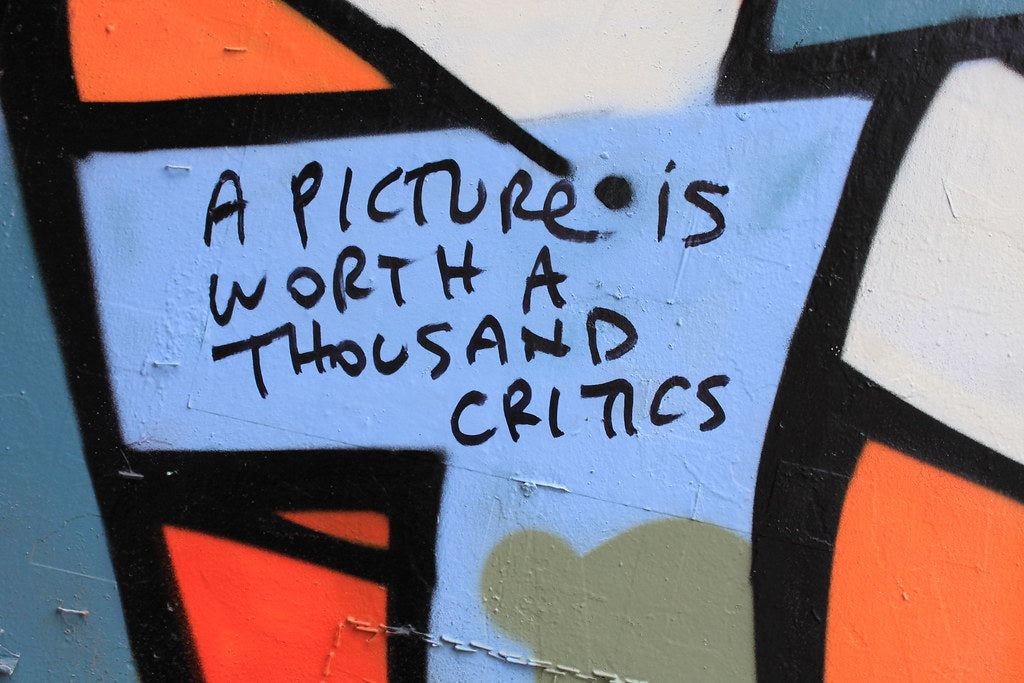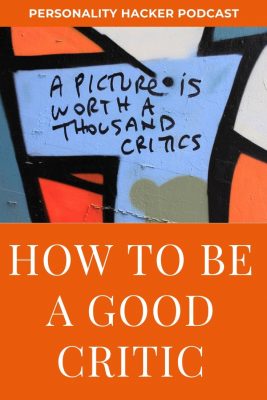Download Episode Here – right click link and select “Save Link As…”
In this episode, Joel and Antonia talk about being a good critic in our overly critical time period.
In this podcast you’ll find:
- Everyone’s a critic
- Youtube: The Critical Drinker
- What makes a good critic?
- To be a good critic, you need to put the work in to understand the fundamentals of what you are criticizing.
- It’s easy to find flaws
- We tend to be critical for the sake of being critical.
- There’s no room for something to just be okay in today’s society.
- We have to find all the ways we don’t agree with something and tear it down.
- One of the reasons storyline and character development is being lost today is because everyone is looking to make sure their ideology is represented well.
- It’s insulting to believe we will lap stuff up because it shares a popular ideology.
- PH has removed a personal agenda from the podcast as much as possible.
- There’s something to be said for sharing a quality message that honors fundamental principles.
- People will usually respect such a message, even if it isn’t ideologically driven.
- The rating system is coming for us.
- A MIND-BLOWINGLY BAD IDEA
- We have become so lazy we can’t even have a conversation with anyone in case we become triggered.
- We need to be honest about how bad we are at being critics.
- Dystopian future
- We are shit at rating things.
- Track your motivations.
- Why do you do certain things?
- When are you critical?
- Why are you critical?
- Powerlessness is often at the root of criticism.
- What can you do to empower yourself at the moment instead of complaining in Yelp later?
- Some criticism is good for calibration, and some is intended to spew piss and vinegar.
- You can’t be empowered in post.
- Use what you’ve learned to empower yourself next time.
- Introverted Feeling requires us to question our motivation.
- You can only be empowered in the present.
- There’s no way to change the past.
- Criticism is our way of recapturing our power after we felt something didn’t go well.
- Criticism is how we are emotionally processing things
- When our sports teams lose, we get super critical about the referee’s calls.
- That’s us expressing our emotions in a situation where we are powerless.
- It is hubris to believe that whatever your personal opinion is should cause someone else to jump in response.
- Your experience isn’t everyone’s experience.
- Most people’s criticism sucks.
- Most of us shouldn’t be critics.
- We can’t differentiate between what is going on with us versus a legitimate bad experience.
- Our society is continually asking for reviews, so we have been trained to be critics and to believe our criticism is of value.
- We take the most offense to things outside of ourselves that reflect the stuff we don’t like about who we are.
- A ton of criticism is actually just projection.
- We hope if we correct something outside us, it will correct the corresponding issue within.
- Most of us would be terrible in the service industry, but we continuously criticize those who are.
- If you are on the receiving end of criticism, try not to focus on it too much.
- Calibrate to valid criticism.
- Let your body of work speak for itself.
- Not every piece of feedback carries the weight of the world.
- Some criticism is of high value.
- Some criticism is just noise.
- One criticism PH gets a lot is that we are doing it all for the money.
- We can’t survive without money, but there are more natural ways to make money.
- The ones who criticize the fact that we charge money for our programs don’t usually have any money, and they are projecting their scarcity on us.
- Your life is your body of work, and the younger generation’s criticism comes from limited experience.
- Nobody is going to help you navigate your life for you.
- It is hard to get criticism and just let it be without feeling the need to respond.
- Your body of work is your life.
- We are all creators.
- It doesn’t matter what people think of you.
- People will keep their erroneous opinion as long as they want to.
- You can be a mirror to other people’s projections, but you don’t have to be a sponge.
- Satire is the best criticism.
- It is fun, accessible, and reflective.
- South Park
- There’s an attack on comedy right now because it is so effective.
- Our egos are so sensitive we can’t even laugh at satire anymore.
- Satire requires a lot of thought.
- Cancel culture
- People are exhausted by having to reconcile multiple agendas, so any pushback feels tiring because we haven’t built the psychological muscle to be able to hold various positions at once.
- We think it’s noble to hold one position in our head.
- If you only hold one agenda, paradigm, perspective, one worldview, you are open to complete corruption.
- Purity comes from refinement.
- You can’t purify something stagnant.
- You have to rub your ideas up against other ideas to refine them.
- If you can’t hold two positions inside your head simultaneously, then you have corrupt ideas.
- We are avoiding anything that may require us to give more attention and thoughtfulness to our ideals.
- So we cancel whatever makes us uncomfortable.
- Anything that sticks has an element of truth to it.
- It’s our job to figure out why the idea is sticky and what the truth of it is.
- We are critical because we don’t want to acknowledge the positives as well as the negatives, which requires holding conflicting opinions/emotions.
- How to be a better critic:
- Is your criticism to help someone calibrate or to tear something down?
- If you are hoping to destroy something, what will fill the vacuum?
- Have a proper perspective.
- Does it matter if you didn’t have a great time?
- Aren’t there more important things to voice your concerns over?
- Why does it matter? Why do you care so much?
- Empowerment is an inside job.
- Empowerment in post is a fantasy.
- How can we alchemize criticism into gratitude?
- If we are critical, we’re going to find more things in life to be critical about.
- If we’re grateful, we’re going to find more things in life to be grateful for.
- Our brains will find what they’re looking for.
To subscribe to the podcast, please use the links below:
Subscribe with iTunes
Non-iTunes Link
Soundcloud
Stitcher
Google Play
Spotify
Radio Public
PlayerFM
Listen Notes
If you like the podcast and want to help us out in return, please leave an honest rating and review on iTunes by clicking here. It will help the show and its ranking in iTunes immensely! We would be eternally grateful!
Want to learn more?
Discover Your Personal Genius
We want to hear from you. Leave your comments below…



Share:
Podcast - Episode 0310 - Taking Risks For What You Love
Podcast - Episode 0312 - Breaking Addiction To The Struggle
6 comments
I believe that nothing is above criticism, but I think the criticism we seem to have in society is not the right kind of criticism. Criticism should always be directed at improvements.
When I receive positive, constructive criticism, I appreciate it. Your comments about Gordon Ramsey reminded me of someone from my own personal life. In high school, my orchestra director was very strict and often critical. But he acted the way he did because he was really pushing us to grow as musicians and reach the potential he saw. And it worked. I’m grateful to people like him, even if I’m not so happy about it in the moment.
As to Antonia’s point about A Christmas Story, I feel it’s a movie with a lot of generational appeal and nostalgia for growing up during that time (albeit, other generations can enjoy it too). I can’t speak for anyone in the religion you grew up in, but I’d imagine that reminder of childhood is what made it acceptable (even if they might not have celebrated Christmas as children themselves). It’s not a bad movie, but it doesn’t have the same impact on people who didn’t have the same childhood experience. My parents are either in the cohort of the youngest boomers or the oldest gen xers (They’re cuspers, which is fitting because I also fall into a blurry area between Generation Y and Z). My dad’s parents are about a decade older than my mom’s parents were. He also grew up with quite a few older siblings who were solidly in the Boomer gen, whereas my mom is the oldest of her siblings. So, my dad relates quite a bit to A Christmas Story while my mom doesn’t at all and has never enjoyed the film. This is strange as you wouldn’t expect such a shift between two people who came from the same town and were born almost exactly a year apart.
And I do appreciate you both presenting content without overloading it with your personal opinions. I’m glad you are conscientious about creating content that can reach as wide of an audience as possible. The world has so much divisive content, and society is in need of more unifying messages that can transcend different paradigms.
What I always find strange is criticism directed at a work based on the beliefs or actions of those who created it. Now, if the person has done something truly heinous, I can understand avoiding their creations. But, in most incidents, I don’t actually think this backlash is warranted.
One of my favorite shows is the X-Files. I brought it up one day while talking to some friends. One friend expressed vaguely negative feelings towards the show due to some transphobic comments Gillian Anderson apparently made at some point (I don’t remember the exact details now). I mentioned that I was aware of that controversy, but—as it was unrelated to the show itself (which does have some poorly aged content) and didn’t involve anyone directly being harmed—I didn’t see a reason for this to make me stop enjoying a show despite my disagreement with an actress’s comments.
Whataboutisms in response to criticism also confuse me as well. I don’t expect everyone to identify it as a logical fallacy, but they should be able to tell when something lacks relevance.
I do agree that rating people through technology is a very bad idea, especially when we’re dealing with text-based communication. Now, not all text-based communication is bad. However, tone and body language are completely absent. Therefore, it’s very easy for people to react in ways the sender did not intend.
I remember when texting first became a big part of culture, how adverse my dad was to it. I thought this was strange when I was younger, but now that I have received many messages that could be interpreted in several different ways, I see exactly why he was hesitant to adopt it.